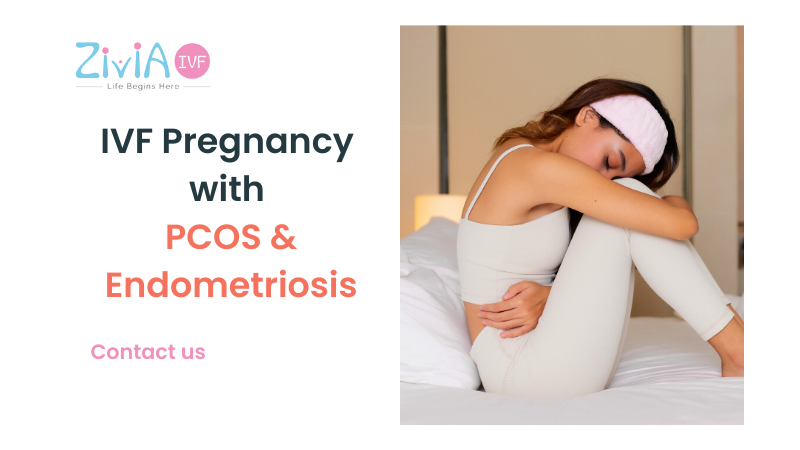
Overview
Infertility is a big concern for many couples. Worldwide, 15% (almost 1 out of 6) couples are suffering from infertility issues. Among all causative factors, PCOS and Endometriosis are major contributors.
Polycystic Ovarian Syndrome or PCOS, can account for 8-10% of cases of women’s infertility, while endometriosis is seen in around 10-15% females suffering from infertility issues. Several women with endometriosis worry about conceiving a child. But, IVF (In Vitro Fertilization) treatment may improve the odds of conceiving a child in such cases.
If PCOS and endometriosis are discovered, it is possible to get pregnant with IVF, thanks to the recent advancements in IVF.
How are Endometriosis and PCOS different?
Though both of these conditions affect reproductive organs, cause hormonal imbalance and have some symptoms in common, they are actually quite different.
Endometriosis is a condition where tissue that resembles the lining of the uterus (Endometrium) grows outside of the uterine cavity, such as on the ovaries, bowel or the tissues lining the pelvis. This type of tissue can cause irritation of surrounding tissue and it can ensue in fibrous scar tissue formation in that area causing adjacent organs like ovaries/ bowel stick together. This causes pain which may worsen up over the period.
PCOS is a condition that affects a female’s hormone levels. Females with PCOS have higher levels of “male hormones,” known as androgens. This can cause excessive hair growth and acne, and can prevent ovulation resulting in irregular periods. Women with PCOS frequently experience insulin resistance, in which the body does not react to insulin as it should. As a result, there is increased insulin or blood sugar levels and weight gain may follow. Women with PCOS are also at a higher risk of cardiovascular (heart) problems and diabetes.
So, the difference between two is, PCOS is caused by an overproduction of androgens, causing hormonal imbalance leading to arrest of ovulation (Egg release) and irregular periods, while in Endometriosis, abnormal growth of uterine lining outside the uterus is linked to excess estrogen.
Nevertheless, both conditions can occur simultaneously as well. The reason postulated is, the excess androgens and Insulin responsible for PCOS manifestations, can lead to excess estrogen, putting female at risk of developing endometriosis.
How PCOS or endometriosis can impact the process of getting pregnant?
As discussed before, in PCOS, there is hormonal imbalance- overproduction of androgens cause arrest of ovulation, that is egg release. Also, high androgen levels further affect egg quality as well as uterine lining, further decreasing the chances of conception/pregnancy.
In Endometriosis, growth of the Endometrial tissue prevents the internal reproductive organs from functioning normally. There can be a restriction on the release of eggs if the ovaries are involved in forming endometrial lining. It is due to the build-up of injured endometrial tissues found outside the uterus, which causes an excruciating swelling and accumulation of blood-filled cysts in the ovary (Chocolate cysts), as well as clusters of scar tissues. Egg quality is also affected because of this, which can cause compromised embryo quality.
While the fallopian tubes are impacted, the sperm may not reach the egg or even the fertilized egg (Embryo) may not be able to go to the uterus.
Although each of these situations could seem difficult, experts advise that IVF treatment is a solid choice to achieve the desired results.
Treatment for Endometriosis and PCOS:-
Both endometriosis and PCOS have treatments available to help with symptom management and fertility, but neither ailment has a known cure. Treatment options include:
- Lifestyle modification – Yoga, meditation and Exercise
- Following a PCOS diet for effective weight management and endometriosis diet for reducing hormone level and relieving pain.
- Pain relief medication
- Hormone therapy, such as hormonal birth control pills (if avoiding pregnancy),
- Surgery, such as laparoscopy for ovarian drilling in PCOS and Adhesiolysis in Endometriosis
- In Vitro Fertilization (IVF) if willing to conceive.
Making lifestyle adjustments to aid with pain management, such as giving up smoking, reducing caffeine intake, eating a more wholesome diet and exercising does help a lot. Depending on how severe the endometriosis is, medical specialists may advise laparoscopic surgery to boost fertility in patients suffering from endometriosis.
Why choose Zivia IVF for expert consultation?
If you have any symptoms mentioned above and require expert consultation to manage the conditions, book an appointment with Zivia IVF today. With a team of skilled professionals backed with advanced equipment, Zivia IVF has helped several women with PCOS or endometriosis, PCOD, and infertility.
